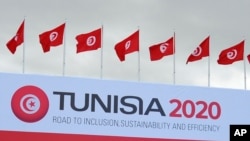His comments come after Tunisian President Kais Saied told IMF Managing Director Kristalina Georgieva during a meeting in Paris on Thursday that the fund's conditions to provide financial support to the North African country risk sparking civil unrest, the presidency said on Friday.
Saied reiterated in his meeting with Georgieva that any required cuts to subsidies, mostly on energy and food, could have detrimental effects on the country, recalling deadly riots that hit Tunisia in 1983 after the government raised the price of bread.
Talks on a $1.9 billion loan have been stalled since October when Tunisia and the IMF reached a preliminary agreement, with Saied rejecting the idea of subsidy cuts and speaking out against the sale of state-owned companies.
Abassi's remarks confirm a Reuters report that Tunisia has put forward an alternative proposal to the lender after President Saied strongly rejected what he called IMF "diktats."
U.S. Secretary of State Antony Blinken this month urged Tunisia to present a revised plan. The European Union announced it would offer 900 million euros ($978.03 million) in loans contingent on an IMF program.
Gulf states are also expected to offer support if an IMF loan is finalised.
Without a loan, Tunisia faces a full-blown balance of payments crisis.
Most debt is internal but there are foreign loan repayments due later this year, and credit ratings agencies have said Tunisia may default.

Forum